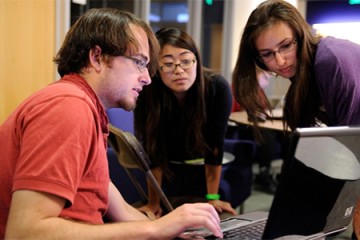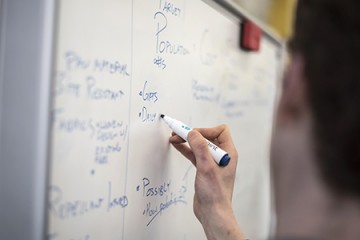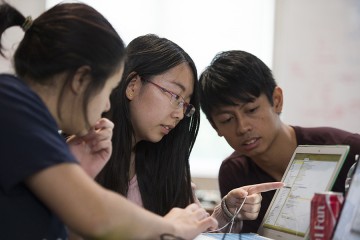In the dead of night at Hodson Hall, the four-student team that would finish first in the spring 2017 HopHacks technology competition struggled to find an idea, something that would grab the judges' attention that they could get in shape to present in about 30 frantic hours.
"We had some really dumb ideas," said Kevin Chen, one of the four freshmen at the University of Maryland College Park who took home the top cash team prize of $1,024 on Sunday, as their memorization app called Speech Portal was chosen the best of 40 projects.
First held in fall 2013 and hosted by JHU's Department of Computer Science, this installment of the twice-a-year event drew 321 graduate and undergraduate students from around the country who spent a weekend working on programming projects and sleeping very little, if at all. As the 36-hour event wore on, Hodson Hall classrooms began to resemble emergency shelters littered with food containers, sleeping bags, blankets.
Also see
Hours after arriving early Friday evening, Chen, Johann Miller, Ricky Han, and Jason Zou sat up in a room in Hodson Hall tossing out prospects. They thought about an application to find the cheapest airline flights on the planet. They thought about a system to perform a type of financial analysis based on domain names. They closed their laptops and made notes on a white board. They went for a walk in the dark.
Somewhere around 3 a.m. Saturday they hit on the idea of creating an app based on the concept of a "memory palace." The term refers to a way to remember information by associating the material with a visual image of a place. Your movement through the imaginary space is meant to take you point-by-point through visual association through the material you want to remember—a speech, a poem, a chemistry formula.
The team developed the concept from an imagined place to actual images using Google Street View, an array of software tools, and an $8 pair of virtual reality goggles they ordered on Amazon that were delivered in two hours.
Members of the team along with hundreds of students worked largely without sleep, ate pizza at odd hours, consumed Red Bull and other stimulants.
"I had these amazing things called caffeine cookies," Chen said.
Second prize of $512 went to a four-member team from Johns Hopkins, Stony Brook University in New York, and Carnegie Mellon University in Pittsburgh for creating an application that can be used to reveal complex webs of association among people using a database of news stories. Third prize of $256 went to a three-member team from Johns Hopkins that created a tool designed to spot cybersecurity threats as they emerge.
Dan Roche, the mentor-in-residence who announced the prizes, said what impressed the judges was the way the Speech Portal group integrated several types of technology in a useful application. He said this round of HopHacks stood out for the number of strong projects.
He told some 150 students gathered for the awards announcement that they all should be commended for making the effort, for stepping out, putting in the time, and creating something.
"Those are the kind of people who make a difference," he said.
Sponsors of the event, which kicked off National Engineers Week on campus, also awarded an array of prizes for specific categories, such as best use of a particular technological tool or top project for a philanthropic purpose. The sponsors were: Bloomberg, Capital One, Google, Accenture, Semester.ly, the Technology Innovation Center, Johns Hopkins University and Medicine, Johns Hopkins Applied Physics Laboratory, Johns Hopkins Alumni Association, and Johns Hopkins Technology Ventures.
Posted in Science+Technology, Student Life
Tagged computer science, hackathon, hophacks










